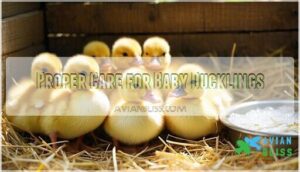This site is supported by our readers. We may earn a commission, at no cost to you, if you purchase through links.

You’ll want to provide them with a warm, safe environment that mimics their natural habitat. Start with a proper brooder, maintain consistent temperatures around 90-95°F for the first week, and gradually reduce heat as they grow.
They’ll require high-protein duck starter feed, clean water for drinking and splashing, and protection from predators. Ducklings grow rapidly, developing waterproof feathers within weeks.
They’re social creatures that bond quickly with their flock and caretakers. Their diet should include balanced nutrition, fresh greens, and occasional treats.
Raising baby ducks can be rewarding if you’re prepared for their unique needs.
Table Of Contents
- Key Takeaways
- What is a Baby Duck Called?
- Can You Have a Baby Duck as a Pet?
- What Do Baby Ducks Need?
- What Can I Feed a Baby Duck?
- Suitable Fruits for Baby Ducks
- Recommended Vegetables for Baby Ducks
- Proper Care for Baby Ducklings
- Reasons for Raising Baby Ducklings
- Tips for Raising Baby Ducks
- Frequently Asked Questions (FAQs)
- Conclusion
Key Takeaways
- You’ll need a specialized brooder with controlled temperatures, starting at 90-95°F and gradually decreasing as your ducklings grow, ensuring they stay warm and healthy.
- You must provide high-protein duckling starter feed (18-20% protein), clean water, and a diet that includes occasional fresh greens and treats to support their rapid development.
- Your ducklings require constant supervision and protection from predators, with a secure shelter that offers draft resistance, proper ventilation, and easy maintenance.
- You’ll want to handle your ducklings gently, socialize them frequently, and be prepared for their unique needs, as raising baby ducks demands commitment but offers rewarding experiences in backyard farming or pet ownership.
What is a Baby Duck Called?
Ever wondered what to call those adorable fluff balls waddling by the pond? Meet the duckling—nature’s cutest waterfowl baby!
These tiny feathered friends start life as soft, chirping bundles of joy, quickly transforming from wobbly walkers to confident swimmers.
Ducklings travel in groups called broods, chattering with unique peeps that change as they grow.
Whether you’re a duck enthusiast or just curious about these aquatic youngsters, understanding duckling basics is your first step into the fascinating world of waterfowl.
Can You Have a Baby Duck as a Pet?
Having a baby duck as a pet requires careful consideration and commitment.
Before diving in, assess your lifestyle and local pet laws. Here’s what you need to know:
- Ducks are social creatures needing companionship
- Specialized care demands time and resources
- Proper habitat is vital for duck health
- Veterinary support specific to waterfowl is essential
Duck socialization matters most. These feathered friends thrive with attention, enrichment activities, and proper bonding.
While raising ducklings can be incredibly rewarding for dedicated pet owners willing to learn and adapt, it is also challenging.
What Do Baby Ducks Need?
If you’re considering raising baby ducks, you’ll need to understand their essential requirements for survival and health.
Providing the right food, water, shelter, heat, and clean-up station will guarantee your ducklings grow into strong, happy waterfowl.
Food
Ready to transform your feathered friend’s diet? With ducklings, nutrition is key. Let’s talk duck nutrition that’ll make your little quacker thrive:
- Choose waterfowl starter feed with 18-20% protein
- Offer unmedicated crumbles designed for young fowl
- Provide consistent access to fresh duckling feed
- Monitor portion sizes to prevent overfeeding
Ducklings are serious eaters, consuming more than chicks. Their dietary needs demand high-quality protein sources like specialized crumbles packed with niacin. Smart tip: Get your feed from farm supply stores and keep it fresh.
Remember, these tiny fluffballs need constant access to food during their first two weeks. Understanding duckling nutritional needs is vital for their development. Consult an avian vet for personalized feeding guidance to support healthy growth and health.
Water
Feeding ducks requires a clean hydration strategy.
Your little water birds crave constant access to shallow water containers that won’t overwhelm their tiny frames.
Keep water bowls no deeper than their head height to prevent accidental drowning.
Waterfowl hydration needs demand frequent water changes and room temperature liquid.
Make separate water stations from feeding areas to maintain pristine conditions.
Monitoring their drinking habits guarantees healthy duck development.
Pro tip: Ducks love splashing, so provide a dedicated water area where they can safely explore their natural aquatic instincts, ensuring healthy duck development and maintaining pristine conditions with frequent water changes.
Shelter
When designing a duck shelter, think of creating a fortress for your feathered friends. Your ducklings need a sanctuary that protects them from the elements and predators.
Here’s what makes an ideal duck shelter:
- Sturdy construction with draft-resistant materials
- Adequate space for comfortable movement
- Secure from aerial and ground predators
- Easy to clean and maintain
Location matters tremendously. Choose a dry, elevated spot away from direct wind and sunlight. Consider using plastic brooders initially, which offer excellent mess management and cleanliness.
Make certain your duck house provides sufficient ventilation without creating cold drafts. Remember, a well-designed shelter isn’t just a structure—it’s your ducklings’ first home, their safe haven from the big, wide world.
Heat
Keep your ducklings toasty with strategic thermal care that mimics their natural habitat. A well-managed brooder temperature is essential for their early survival and growth.
Start with a warm 90°F environment and gradually decrease heat by 5°F weekly, allowing ducklings to adapt to changing climate conditions. Providing a proper heat lamp setup is essential for maintaining the ideal temperature.
| Heat Source | Recommended Use |
|---|---|
| Heat Lamp | First 2-6 weeks |
| Heat Plate | Safer alternative |
| Heating Pad | Localized warmth |
| Hot Water Bottle | Emergency heating |
Monitor their behavior closely: huddling indicates heat stress, while panting suggests excessive warmth. Position heat sources to create temperature gradients, enabling ducklings to self-regulate their thermal comfort and preventing potential developmental complications. This approach ensures a healthy environment, promoting the early survival and growth of your ducklings.
Clean-up Station
After warming your ducklings, you’ll need a stellar clean-up station to manage their messy world. Your duck brooder deserves a strategic hygiene approach that tackles mess management head-on.
Keep your duck brooder clean—a tidy home means happy, healthy ducklings waddling their way to success!
- Select absorbent bedding like pine shavings to soak up unexpected surprises
- Choose shallow, washable trays for easy water quality maintenance
- Keep a duck-safe disinfectant spray within arm’s reach
Duckling care isn’t for the faint of heart. These feathered tornados can turn a pristine space into a disaster zone faster than you can say "quack".
Pro tip: washable duck diapers can be your secret weapon during indoor adventures, but they’re not a perfect potty-training solution. Effective duck brooder supplies are essential for maintaining a clean and healthy environment.
What Can I Feed a Baby Duck?
Anyone raising ducklings needs a strategic approach to nutrition. Your baby ducks require specialized duck feed options designed for their rapid growth and unique nutrient requirements.
Start with an unmedicated waterfowl starter crumb packed with high-protein content (20-22%) during the first two weeks. Feed them 3-4 times daily, gradually adjusting portion sizes as they develop.
Protein sources are critical in a duckling diet. Supplement their feed with finely chopped greens like dandelions, kale, and Swiss chard. Dried insects and shrimp make excellent occasional treats that boost protein intake.
Water quality matters immensely – provide fresh, clean water alongside their meals. As ducklings mature, switch to growers pellets around four weeks. Skip bread and processed foods that lack essential nutrition.
Your goal is a balanced diet supporting healthy development. Remember, these little swimmers need consistent, nutrient-rich meals to thrive and grow into robust, happy ducks. For ideal growth, consider duck feed options that cater to their specific needs.
Suitable Fruits for Baby Ducks
After mastering your duckling’s basic diet, it’s time to explore fruit nutrition and berry selection. Not all fruits are duck-approved!
When introducing sweet treats, follow these guidelines:
- Mash soft fruits like bananas and strawberries to prevent choking
- Remove seeds and tough skins from fruits before serving
- Limit fruit portions to occasional treats, not daily meals
Blueberries, watermelon, and seedless grapes offer nutritional boosts when prepared carefully. Just remember: moderation is key in your duckling’s tropical-inspired diet.
Their tiny digestive systems appreciate gentle, small-portioned surprises that add variety without overwhelming their nutritional needs.
Recommended Vegetables for Baby Ducks
Almost always, veggies are a powerhouse of nutrition for your growing ducklings.
Leafy greens like kale, spinach, and lettuce pack a serious nutrient punch for duckling diet development.
These water-loving birds thrive on fresh, chopped vegetables that support their rapid growth and overall health.
Introduce new duckling greens gradually to prevent digestive upset.
Your feathered friends will quack with joy over this nutrient-rich buffet!
They will appreciate the variety of veggies like leafy greens and fresh vegetables.
Proper Care for Baby Ducklings
Your baby duck sanctuary starts with gentle handling and vigilant care. Create a secure, nurturing environment that supports healthy duckling growth.
Monitor their daily needs closely, ensuring clean water, appropriate temperature, and a predator-proof habitat. Your brooder should be a fortress of comfort, with fresh bedding changed frequently and warm zones that protect these vulnerable little swimmers.
Watch swimming sessions carefully, keeping ducklings dry and safe afterward. Track their development through careful observation, noting changes in behavior and physical condition.
Proper duckling care means staying one step ahead—anticipating their needs for nutrition, hydration, and protection while building a bond of trust that’ll guide their journey from fluffy hatchling to robust adult duck. Understanding duckling nutritional needs is essential for their overall health and development, focusing on overall health.
Reasons for Raising Baby Ducklings
You might want to raise baby ducks for their versatile benefits, including fresh eggs, meat production, and natural pest control.
Whether you’re a homesteader, hobby farmer, or backyard enthusiast, ducklings can offer practical advantages while providing charming companionship to your agricultural or residential environment, with versatile benefits.
Adorable, practical ducklings: tiny feathered friends that transform backyards into vibrant, delightful ecosystems of joy and purpose.
Egg and Meat Production
If you’re diving into duck farming, understanding egg and meat production is key.
Pekin and Muscovy breeds lead the pack for efficient poultry operations. Choose the right duck breed to maximize your hatchery management goals.
Top breeds like Pekin ducks can yield up to 175 eggs annually and provide excellent meat yield.
Smart breeding methods and proper duckling nutrition guarantee healthy, productive flocks that meet your farming aspirations, ensuring efficient poultry operations and a successful hatchery management.
Pest Control Benefits
Beyond egg production, ducks serve as nature’s pest control champions in your garden.
These feathered friends transform your yard into a thriving ecosystem through strategic foraging.
- Insect control: Ducks devour harmful garden pests like mosquito larvae and beetles
- Weed management: Their natural pecking disrupts weed growth and seeds
- Slug removal: They hunt down destructive snails and slugs with remarkable efficiency
Ducks eliminate the need for chemical pesticides by naturally managing pest populations.
Their instinctive hunting behaviors protect aquatic plants and garden spaces, creating a balanced, chemical-free environment where your green spaces can flourish without artificial intervention.
Enjoyable Backyard Pets
With their quirky personalities and irresistible charm, ducklings transform backyard spaces into delightful habitats of joy and connection.
These feathered companions offer more than just cuteness. Understanding duck breeding programs is essential for raising healthy ducklings.
| Benefit | Impact | Experience |
|---|---|---|
| Companionship | Social | Interactive |
| Entertainment | Playful | Engaging |
| Learning | Educational | Rewarding |
Discover the magic of duck socialization and witness how these adorable creatures become unforgettable backyard friends, providing companionship and entertainment.
Tips for Raising Baby Ducks
After exploring the potential benefits of raising ducklings, let’s unpack the nitty-gritty of keeping these feathered friends thriving.
Your duckling care journey starts with creating a safe, warm sanctuary that meets their specific needs.
- Craft a secure brooder that feels like a cozy duck resort
- Provide shallow water sources for safe, supervised splashing
- Serve up nutritionally balanced meals for robust growth
- Handle your ducklings gently to build trust and companionship
- Monitor their environment with the precision of a duck detective
Successful duck habitat management requires keen observation and consistent care.
Watch their feather development closely and adjust their shelter as they grow.
Maintain a clean brooder to prevent disease and support duckling health.
Remember, these tiny creatures depend entirely on your careful attention.
Their growth stages demand your commitment—from maintaining ideal temperature to ensuring proper nutrition, including a high protein diet.
With patience and careful management, you’ll help your ducklings transform from fluffy babies into confident, healthy waterfowl.
Frequently Asked Questions (FAQs)
What is a baby duck called?
Ever wondered about nature’s cutest waterbird offspring?
A baby duck is called a "duckling" – those adorable, fluffy creatures waddling near ponds, hatching from eggs and quickly learning to swim, explore, and quack their way through life.
They are adorable creatures that bring joy to those who observe them.
How to raise Baby Ducks?
You’ll need a warm brooder, high-protein feed, fresh water, and predator protection.
Keep them clean, socialize regularly, and provide gradual temperature decreases.
Monitor their health, supplement with niacin, and offer safe outdoor exploration as they grow, ensuring complete concepts are applied for their development.
Are Baby Ducks cute?
You’ll melt when you see baby ducks.
Their fluffy, downy bodies, oversized feet, and tiny chirps create an irresistible package of adorableness that’ll instantly make you go "aww" and want to cuddle them.
Where do baby ducks live?
You’ll find baby ducks nestled in nests near water sources like ponds, marshes, and riverbanks.
Their mothers create cozy, hidden spots lined with downy feathers, protecting them from predators while providing warmth and safety.
What are 9 facts about baby ducks?
You’ll discover ducklings boast yellow bellies, massive webbed feet, and rapid growth.
They’re social swimmers who eat insects, navigate waters quickly, and develop adult feathers within months.
Their survival skills start early in life.
How much does a baby duck weigh?
Coincidentally, a baby duck’s weight varies by species.
You’ll find most mallard ducklings tip the scales at 30 to 40 grams (0 to 4 ounces), with some slight variations depending on their unique breed and individual genetics.
This information highlights that there are variations depending on their unique breed.
How do you raise a baby duck?
Provide a warm, draft-free brooder with temperature-controlled environments.
Feed high-protein starter feed, supplement with niacin-rich foods.
Offer clean water daily.
Protect from predators.
Make certain social interaction and gentle handling for healthy, happy ducklings.
Why is baby duck care important?
Proper duck care guarantees survival, preventing health risks.
You’ll nurture resilient, thriving companions by understanding their unique nutritional, environmental, and social needs.
Attentive care transforms vulnerable ducklings into robust, healthy waterfowl, creating a rewarding experience.
What do you call baby ducks?
You’ll call newborn ducks "ducklings," a cute term that perfectly captures their adorable, fluffy stage.
These tiny water-loving babies waddle and swim, bringing joy to nature lovers and backyard wildlife enthusiasts everywhere.
Can I keep a duck as a pet?
You can keep a duck as a pet, but they’re high-maintenance.
They need specialized care, water access, and companionship.
Ducks aren’t like typical pets and require significant commitment, outdoor space, and understanding of their unique needs.
Conclusion
Ultimately, raising baby ducks isn’t just a task—it’s an adventure in nurturing life.
You’ll discover that these feathered friends require dedication, but they’ll reward you with endless charm.
Your baby duck journey will teach patience, responsibility, and the joy of watching tiny waterfowl grow.
Whether for eggs, pest control, or pure enjoyment, these adorable creatures will transform your backyard into a vibrant ecosystem of learning and delight.
- https://www.ducks.org/conservation/waterfowl-research-science/how-ducks-navigate
- https://www.chickenvet.co.uk/coccidiosis-in-ducks-and-geese
- https://duckdvm.com/condition/thiamin-deficiency
- https://naturemuseum.org/2016/05/what-is-angel-wing-syndrome/
- https://www.hgtv.com/outdoors/gardens/animals-and-wildlife/raising-ducks-caring-for-ducklings











